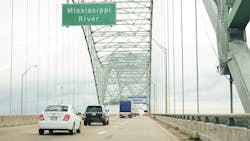The U.S. Senate late Wednesday voted to start debating a bipartisan infrastructure bill worth about $1 trillion, signaling enough potential support for a key part of President Joe Biden’s agenda.
About $550 billion of the proposed bill includes new federal spending on hard infrastructure, including $40 billion for bridge repairs and $7.5 billion to build a national network of charging stations for electric vehicles. The new funding would also include more than $70 billion to rebuild the electric grid, $66 billion for freight and passenger rail, $65 billion to expand broadband Internet access, and $39 billion for public transit.
Other financing mechanisms would be used to pay for the other half of the bill. That money would bring the total spent on improving roads, bridges, and other major transportation projects to $110 billion.
A bipartisan group of 21 senators, led by Rob Portman (R-Ohio) and Krysten Sinema (D-Arizona), announced the deal early on Wednesday, issuing a statement calling the agreement “the strongest investment in America’s critical infrastructure in a generation. Our plan will create good-paying jobs in communities across our country without raising taxes.”
The Senate voted 67-32 to begin debate on the bill, the first procedural vote in a long line of many steps before any bill would be approved in both houses of Congress and sent to Biden for his signature.
“We have been working with Democrats and Republicans to get this done because while there is a lot that we don’t agree on, I believe that we should be able to work together on the few things we do agree on,” Biden said during a visit to Mack Trucks’ Lehigh Valley Assembly Operations facility in Pennsylvania on Wednesday.
Previous presidents have pushed for major infrastructure spending only to find Congressional gridlock too hard to overcome. This $1 trillion in spending would be the largest infrastructure bill in U.S. history, surpassing the Obama Era American Recovery and Reinvestment Act, which totaled more than $800 billion but only spent about $48 billion on actual infrastructure.
“It’s refreshing to see Congress do its job and address national problems facing businesses and families,” said Chris Spear, president and CEO of the American Trucking Associations. Americans, and the hardworking men and women who carry this economy on trucks, have waited long enough for Washington to act on our decaying infrastructure. We cheer this bipartisan breakthrough and hope it helps elected officials find more areas where they can work together to actually get things done.”
About the Author
Josh Fisher
Editor-in-Chief
Editor-in-Chief Josh Fisher has been with FleetOwner since 2017. He covers everything from modern fleet management to operational efficiency, artificial intelligence, autonomous trucking, alternative fuels and powertrains, regulations, and emerging transportation technology. Based in Maryland, he writes the Lane Shift Ahead column about the changing North American transportation landscape.

